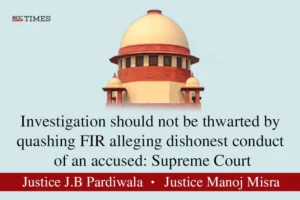Supreme Court: While considering the instant appeal filed by the original complainant (appellant), against the decision of Jharkhand High Court whereby the Court had quashed the order of cognizance and all further proceedings for offences punishable under Ss. 406 and 420 of Penal Code, 1860; the Division Bench of J.B Pardiwala and Manoj Misra*, JJ., held that Court must apply its mind to the materials submitted in support of the police report before taking a call whether the FIR and consequential proceedings should be quashed or not; more so, when the FIR alleges an act which is reflective of dishonest conduct of the accused. Thus, when the FIR alleges dishonest conduct on the part of the accused which, if supported by materials, would disclose commission of a cognizable offence, investigation should not be thwarted by quashing the FIR.
Background:
2nd and 3rd Respondents offered to take appellant’s truck on a monthly rent of Rs 33,000, exclusive of driver’s/helper’s salary, for plying it between Tata Steel Jamshedpur and Kalinganagar; pursuant to that offer, an agreement was entered into between the appellant and the accused on 10-07-2014 thereby letting the vehicle to the Respondents for a period up to 31-03-2016 with effect from 14-07-2014; and, in furtherance thereof, possession of the truck was given to the Respondents.
The Respondents paid one month’s rent month rent, after deducting TDS. But thereafter, though the Truck had been in possession of the Respondents since July 2014, rent including arrears amounting to Rs.12,49,780 was not paid despite repeated false assurances.
The appellant filed an application, under Section 156(3), CrPC, and the CJM directed the police to institute a case and investigate. During investigation when despite notice under Section 41-A, CrPC the Respondents did not appear, the police applied to the CJM for issuance of non-bailable warrant against them.
Aggrieved, the Respondents sought quashment before the Jharkhand High Court. While the application under Section 482, CrPC was pending before the High Court, the CJM took cognizance of the matter on the basis of a police report, and processes were issued under Section 204 CrPC. Consequently, 2nd and 3rd Respondent sought amendment in their prayer before the High Court to include the prayer to quash the cognizance order.
The High Court vide impugned order quashed the order of cognizance and all further proceedings in the case concerned while leaving it open to the original complainant to take recourse to civil remedies.
Court’s Assessment:
Perusing the matter, the Court pointed out that at the stage of deciding whether a criminal proceeding or FIR, is to be quashed at the threshold or not, the allegations in the FIR or the police report or the complaint, including the materials collected during investigation or inquiry, are to be taken at their face value to determine whether a prima facie case for investigation or proceeding against the accused is made or not. The correctness of the allegations is not to be tested at this stage.
The Court further reiterated that mens rea is an important element vis-a-vis commission of an offence unless it has been excluded explicitly by a penal statute. The existence of mens rea is a question of fact which may be inferred from the act in question as well as the surrounding circumstances and conduct of the accused.
The Court pointed out that as a sequitur, when a party alleges that the accused, despite taking possession of the Truck on hire, has failed to pay hire charges for months together, while making false promises for its payment, a prima facie case, reflective of dishonest intention on the part of the accused, is made out which may require investigation. “In such circumstances, if the FIR is quashed at the very inception, it would be nothing short of an act which thwarts a legitimate investigation.”
The Court also reiterated that FIR is not an encyclopedia of all imputations. Therefore, to test whether an FIR discloses commission of a cognizable offence what is to be looked at is not any omission in the accusations, but the gravamen of the accusations contained therein to find out whether, prima facie, some cognizable offence has been committed or not. “At this stage the Court is not required to ascertain as to which specific offence has been committed. It is only after investigation, at the time of framing charge, when materials collected during investigation are before the Court, the Court has to draw an opinion as to for commission of which offence the accused should be tried. Prior to that, if satisfied, the Court may even discharge the accused”.
The Court noted that in the instant case, the FIR alleged that the Respondents took appellant’s truck on hire for a certain period and at a monthly rent; but, after payment of 1st month’s rent, the rent was not paid despite false assurances. The allegation that rent was not paid by itself, in ordinary course, would presuppose retention of possession of the vehicle by the accused. In such circumstances as to what happened to that Truck becomes a matter of investigation. “If it had been dishonestly disposed of by the accused, it may make out a case of criminal breach of trust. Therefore, there was no justification to quash the FIR at the threshold without looking into the materials collected during the course of the investigation”.
The Court opined that the High Court ought to have considered the materials collected during investigation before taking a call on the prayer for quashing the FIR, the cognizance order and the proceedings in pursuance thereof.
Hence, the Court allowed the appeal and decided to remit the matter to Jharkhand High Court to decide the quashment petition afresh in accordance with law after considering the materials collected by the investigating agency during the course of the investigation.
CASE DETAILS
|
Citation: Appellants : Respondents : |
Advocates who appeared in this case For Petitioner(s): For Respondent(s): |
CORAM :

